AWM41 1020 - [Nurses Narratives] Staff Nurse Lily M Payne - Part 1
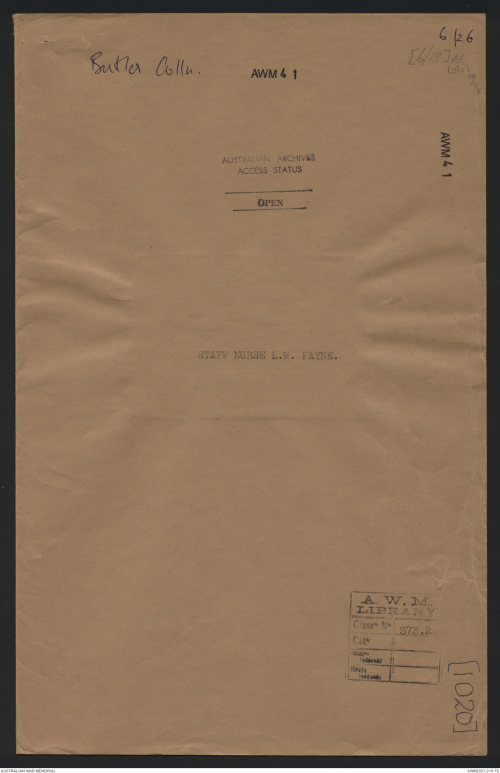
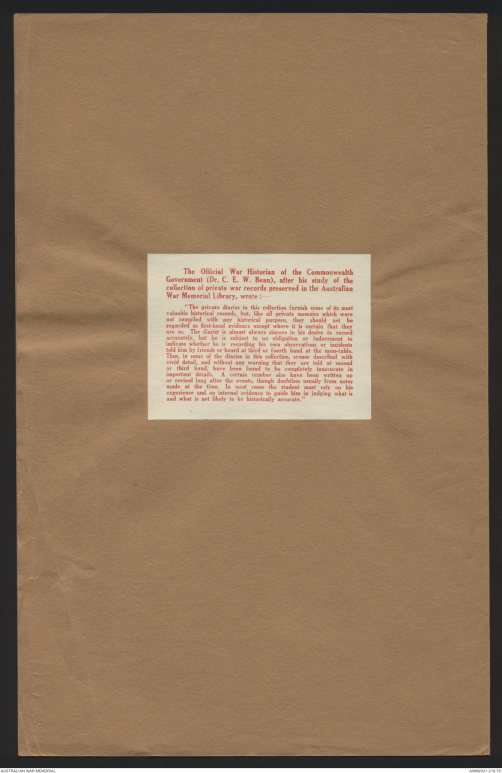
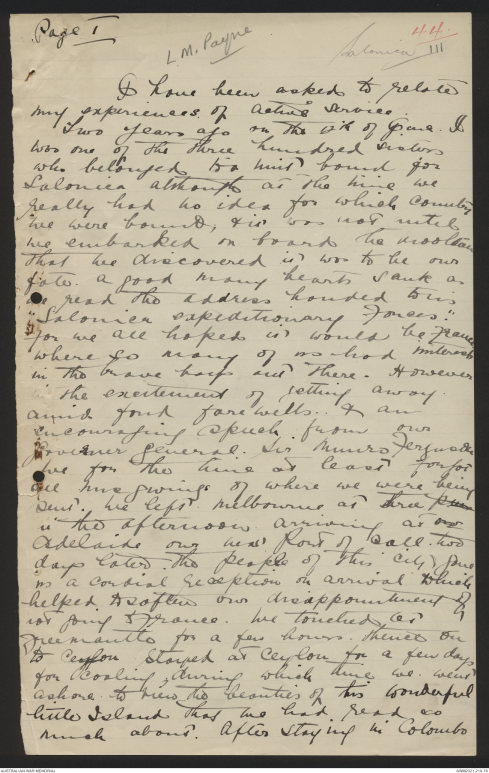
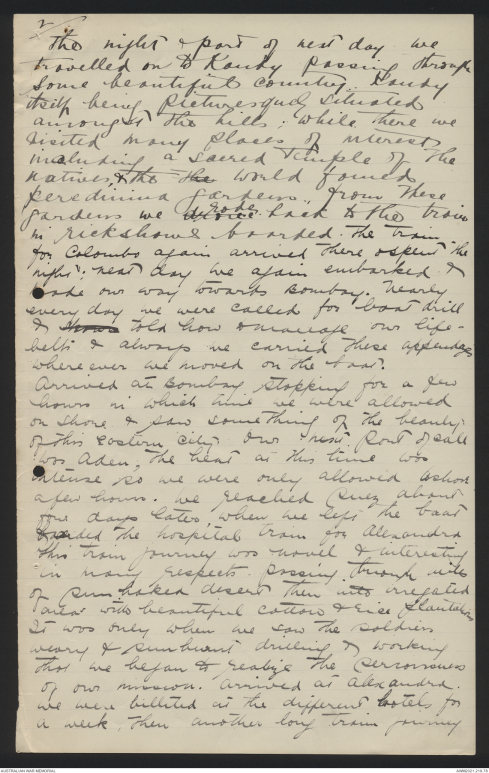
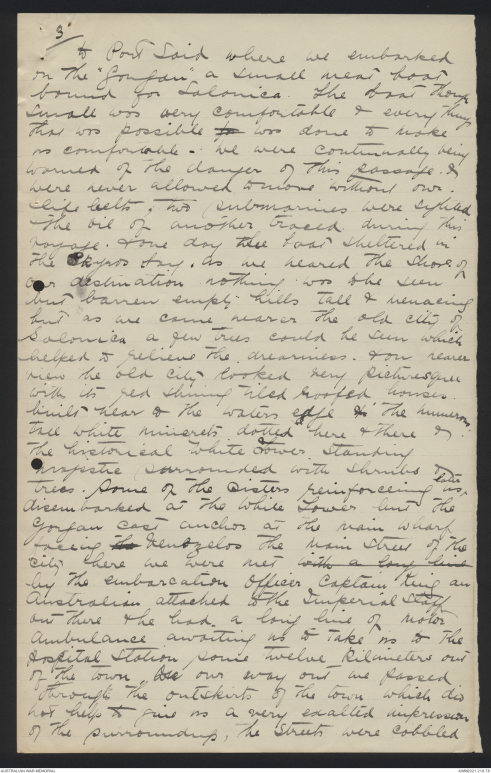
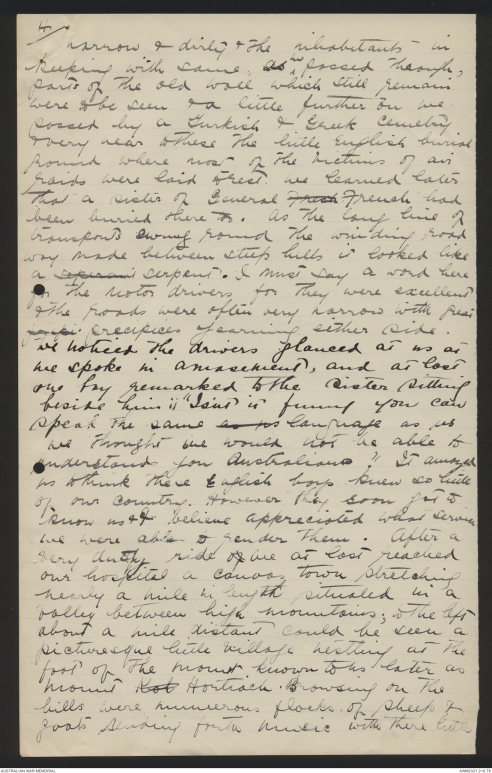
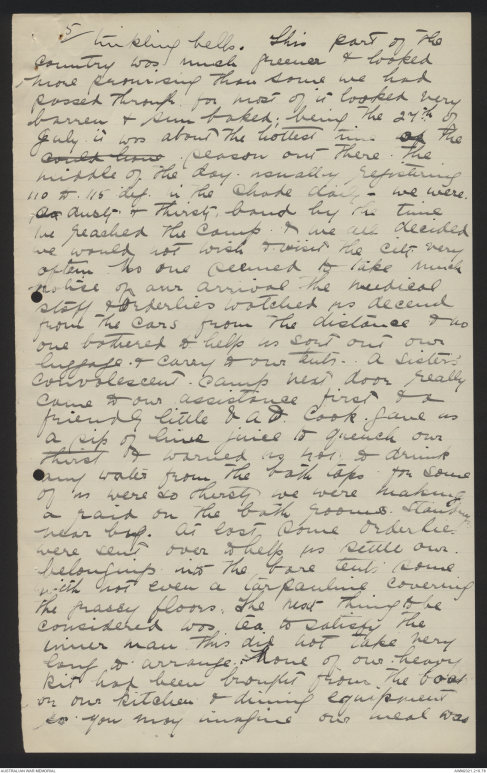
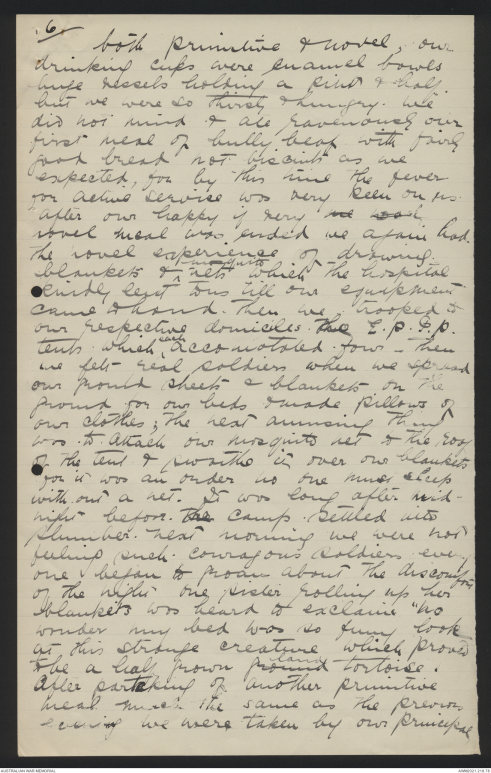
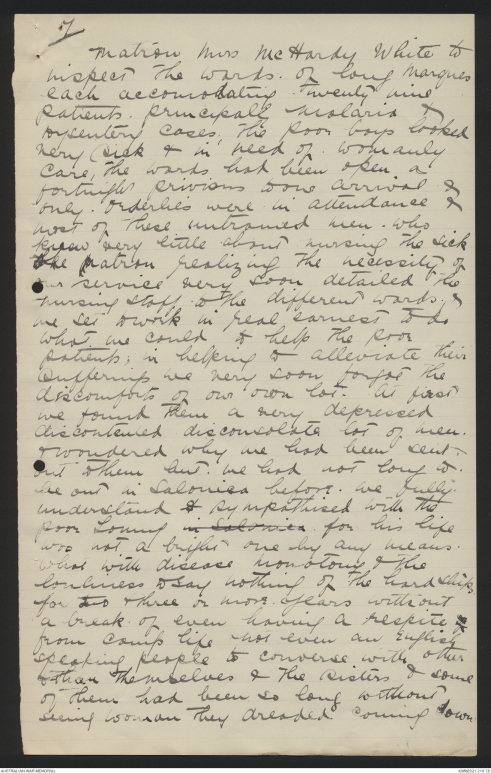
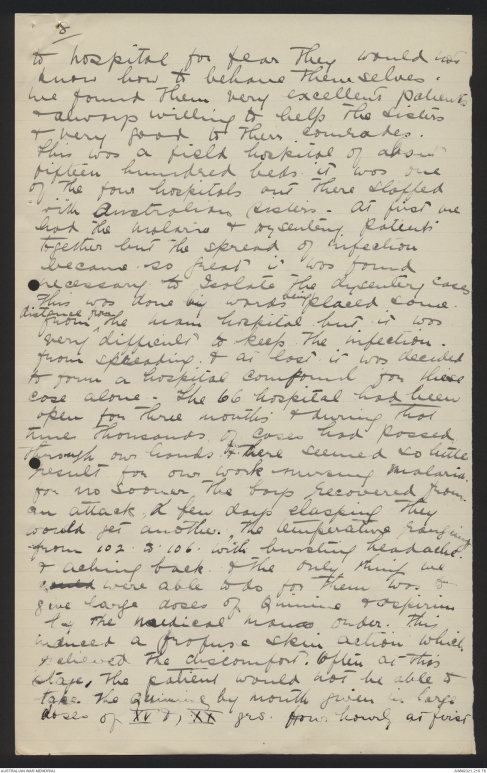
6/26
[6/19]
[[?]]
Butler Colln.
[*AWM 41*]
AUSTRALIAN ARCHIVES
ACCESS STATUS
OPEN
STAFF NURSE L.M. PAYNE.
A.W.M.
LIBRARY
Class No 373.2
[*1020*]
The Official War Histories of the Commonwealth
Government (Dr. C. E. Bean), after his study of the
collection of private war records preserved in the Australian
War Memorial Library, wrote:
"The private diaries in this collection furnish some of the most
valuable historical records, but, like all private memoirs which were
not completed with any historical purpose, they should not be
regarded as first-hand evidence except where it is certain that they
are so. The diarist is almost always sincere in his desire to record
accurately, but he is subject to no obligation or inducement to
indicate whether he is recording his own observations or incidents
told him by friends or heard at third or fourth hand at the mess-table.
Thus, in some of the diaries in this collection, scenes described with
vivid detail, and without any warning that they are told at second
or third hand, have been found to be completely inaccurate in
important details. A certain number also have been written up
or revised long after the events, though doubtless usually from notes
made at the time. In most cases the student must rely on his
experience and on internal evidence to guide him in judging what is
and what is not likely to be historically accurate."
Page 1
LM. Payne
44/111
Salonica
I have been asked to relate
my experiences of active service.
Two years ago on the 12th of June. I
was one of the three hundred sisters
who belonged to a unit bound for
Salonica although at the time we
really had no idea for which country
we were bound, & it was not until
we embarked on board the Mooltan
that we discovered it was to be our
fate. A good many hearts sank as
we read the address handed to us
"Salonica expeditionary Forces".
for we all hoped it would be France
where so many of us had interests
in the brave boys out there. However
in the excitement of getting away
amid fond farewells & an
encouraging speech from our
Governor General Sir Munro Ferguson
we for the time at least forgot
all misgivings of where we were being
sent. We left Melbourne at three pm
in the afternoon arriving at our
Adelaide our next Port of call two
days later. The people of this city gave
us a cordial reception on arrival which
helped to soften our disappointment of
not going to France. We touched at
Freemantle for a few hours thence on
to Ceylon. Stayed at Ceylon for a few days
for coaling, during which time we went
ashore to view the beauties of this wonderful
little Island that we had read so
much about. After staying in Colombo
2
the night and part of next day we
travelled on to Kandy passing through
some beautiful country. Kandy
itself being picturesquely situated
amongst the hills; while there we
visited many places of interest
including a sacred temple of the
natives, & the the world famed
Peredinina gardens., from these
gardens we drove rode back to the train
in rickshaws boarded the train
for Colombo again arrived there & spent the
night. Next day we again embarked &
made our way towards Bombay. Nearly
every day we were called for boat drill
& Nurses told how to manage our life-belts
& always we carried these appendages
wherever we moved on the boat!
Arrived at Bombay stopping for a few
hours in which time we were allowed
on shore & saw something of the beauty
of this Eastern city. Our next Port of call
was Aden, the heat at this time was
intense so we were only allowed ashore
a few hours. We reached Suez about
four days later, where we left the boat
& boarded the hospital train for Alexandria.
This train journey was novel and interesting
in many respects passing through miles
of sun baked desert then into irrigated
areas with beautiful cotton & rice plantations.
It was only when we saw the soldiers
weary and sunburnt drilling & working
that we began to realize the seriousness
of our mission. Arrived at Alexandria.
we were billeted at the different hotels for
a week. Then another long train journey
3
to Port Said where we embarked
on the "Gorgon” a small neat boat
bound for Salonica. The boat though
small was very comfortable & everything
that was possible for was done to make
us comfortable. We were continually being
warned of the danger of this passage &
were never allowed to move without our
life belts. Two submarines were sighted
the oil of another traced during this
voyage & one day the boat sheltered in
The Skyros bay. As we neared the shore of
our destination nothing was to be seen
but barren empty hills tall & menacing
but as we came nearer the old city of
Salonica a few trees could be seen which
helped to relieve the dreariness. & on nearer
view the old city looked very picturesque
with its red shining tiled roofed houses
built near to the waters edge & the numerous
tall white minerets dotted here & there &
the historical White Tower standing
majestic surrounded with shrubs &
trees. Some of the sisters reinforceing us ^later
disembarked at the White Tower but the
Gorgon cast anchor at the main wharf
facing the Venizelos the main street of the
city where we were met with a long line
by the embarcation Officer Captain King an
Australian attached to the Imperial staff
out there & he had a long line of motor
ambulance awaiting us to take us to the
Hospital Station some twelve kilometers out
of the town. We our way out we passed
through the outskirts of the town which did
not help to give us a very exalted impression
of the surroundings. The streets were cobbled
4
narrow & dirty & the inhabitants in
keeping with same. As ^we passed through,
parts of the old wall which still remain
were to be seen & a little further on we
passed by a Turkish & Greek Cemetry
& very near to these the little English burial
ground where most of the victims of air
raids were laid to rest. We learned later
that a sister of General Frech French had
been buried there too. As the long line of
transports swung round the winding road
way made between steep hills it looked like
a seperant serpent. I must say a word here
for the motor drivers for they were excellent
& the roads were often very narrow with great
xxxx precipices yearning either side.
We noticed the drivers glanced at us as
we spoke in amasement, and at last
one boy remarked to the sister sitting
beside him, "Isn't it funny you can
speak the same as us language as us
we thought we would not be able to
understand you Australians." It amazed
us to think these English boys knew so little
of our country. However they soon got to
know us & I believe appreciated what service
we were able to render them. After a
very dusty ride of we at last reached
our hospital a canvas town stretching
nearly a mile in length situated in a
valley between high mountains; to the left
about a mile distant could be seen a
picturesque little village nestling at the
foot of the Mount known to us later as
Mount Kol Hortiach. Browsing on the
hills were numerous flocks of sheep &
goats sending forth music with there little
5
tinkling bells. This part of the
country was much greener & looked
more promising than some we had
passed through for most of it looked very
barren & sun baked; being the 27th of
July it was about the hottest time of the
could have season out there. The
middle of the day usually registering
110 to 115 deg. in the shade daily - we were
as dusty & thirsty, bound by the time
we reached the camp & we all decided
we would not wish to visit the city very
often. No one seemed to take much
notice of our arrival. The medical
staff & orderlies watched us descend
from the cars from the distance & no
one bothered to help us sort out our
luggage & carry to our tents. A sisters
convalescent camp next door really
came to our assistance first & a
friendly little V.A.D. Cook gave us
a sip of lime juice to quench our
thirst & warned us not to drink
any water from the bath taps for some
of us were so thirsty we were making
a raid on the bath rooms standing
near by. At last some orderlies
were sent over to help us settle our
belongings into the bare tents some
with not even a tarpauline covering
the grassy floors. The next thing to be
considered was tea to satisfy the
inner man. This did not take very
long to arrange. None of our heavy
kit had been brought from the boat
or our kitchen & dining equipment
so you may imagine our meal was
6
both primitive & novel, our
drinking cups were enamel bowls
huge vessels holding a pint & half.
but we were so thirsty & hungry we
did not mind & ate ravenously our
first meal of bully beef with fairly
good bread not biscuits as we
expected, for by this time the fever
for active service was very keen on us.
After our happy if very xx xxxx
novel meal was ended we again had
the novel experience of drawing
blankets & ^mosquito nets which the hospital
kindly lent to us till our equipment
came to hand. Then we trooped to
our respective domiciles. the E.P.G.P.
tents which each accomotated four - then
we felt real soldiers when we spread
our ground sheets & blankets on the
ground for our beds & made pillows of
our clothes; the next amusing thing
was to attach our mosquito net to the roof
of the tent & swathe it over our blankets
for it was an order no one must sleep
without a net. It was long after midnight
before the camp settled into
slumber. Next morning we were not
feeling such couragous soldiers every
one began to groan about the discomfort
of the night one sister rolling up her
blankets was heard to exclaim "no
wonder my bed was so funny look
at this strange creature which proved
to be a half grown ground land tortoise.
After partaking of another primitive
meal much the same as the previous
evening we were taken by our Principal
7
Matron Miss McHardy White to
inspect the wards. of long marques
each accomodating twenty nine
patients. Principally Malaria &
Dysentery cases, the poor boys looked
very sick & in need of womanly
care, the wards had been open a
fortnight previous to our arrival &
only orderlies were in attendance &
most of these untrained men who
knew very little about nursing the sick
The Matron realizing the necessity of
our service very soon detailed the
nursing staff to the different wards. &
we set to work in real earnest to do
what we could to help the poor
patients, in helping to alleviate their
sufferings we very soon forgot the
discomforts of our own lot. At first
we found them a very depressed
discontented disconsolate lot of men.
& wondered why we had been sent
out to them but we had not long to
be out in Salonica before we fully
understand & sympathised with the
poor Tommy in Salonica for his life
was not a bright one by any means.
What with disease monotony & the
lonliness to say nothing of the hardships
for two & three or more years without
a break of even having a respite of
from camp life not even an English
speaking people to converse with other
& than themselves & the sisters & some
of them had been so long without
seeing woman they dreaded coming down
8
to hospital for fear they would not
know how to behave themselves.
We found them very excellent patients
& always willing to help the sisters
& very good to their comrades.
This was a field hospital of about
fifteen hundred beds it was one
of the four hospitals out there staffed
with Australian Sisters. At first we
had the malaria & dysentery patients
together but the spread of infection
became so great it was found
necessary to isolate the dysentery cases
This was done by wards ^being placed some
distance away
from ^the main hospital but it was
very difficult to keep the infection
from spreading & at last it was decided
to form a hospital compound for these
case alone. The 66 hospital had been
open for three months & during that
time thousands of cases had passed
through our hands & there seemed so little
result for our work nursing malaria
for no sooner the boys recovered from
an attack, a few days elapsing they
would get another, the temperature ranging
from 102. to 106. with bursting headache
& aching back & the only thing we
could were able to do for them was to
give large doses of Quinine & Aspirin
by the Medical nurses order. This
induced a profuse skin action which
relieved the discomfort. Often at this
stage, the patient would not be able to
take the Quinine by mouth given in large
doses of XV & XX grs. four hourly at first
 Sam scott
Sam scottThis transcription item is now locked to you for editing. To release the lock either Save your changes or Cancel.
This lock will be automatically released after 60 minutes of inactivity.